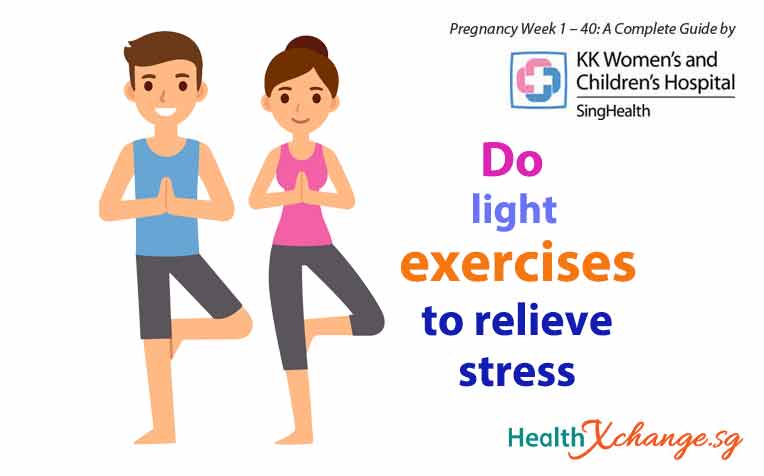
Pregnancy week 9 , engage in light exercises if you find yourself getting too stressed and emotional about your pregnancy.
For mom
Your symptoms may intensify at pregnancy week 9 and it is very important to have a strong support network that you can rely on to help you get through the first trimester.
Your support network may include your partner, family or friends.
Tip: If you find that you’re getting too stressed out or emotional, take a step back and disengage yourself from stressors that you can identify. Also, find someone dependable you can rely on for help.
You may find light exercises helpful in relieving your frustrations. Examples of things you can do include
- Swimming
- Cycling
- Yoga
- Pilates and
- Low impact aerobics
Exercise will help you sleep better and therefore, feel less tired. Before embarking on any exercise, please check with your doctor that you do not have any obstetric complications.
Screening for Down’s Syndrome
You may have been introduced to the subject of screening tests for Down's syndrome and other conditions at pregnancy week 8. Pregnancy screening tests may be more important, especially in cases of increasing maternal age.
Down's syndrome is the most common cause of learning disability and mental impairment in children. Most of the time, it is caused by an extra chromosome in the child's DNA. The risk of having a child with Down’s syndrome increases with maternal age.
Data has shown that the risk of having a baby with Down's Syndrome is approximately 1:250 at 12 weeks of pregnancy. After 35 years old, the risk of having a baby with Down’s Syndrome increases exponentially.
Both screening and definitive tests are available.
Nuchal translucency test
Usually, women are advised to go for a different type of ultrasound test anytime between weeks 11 to 14. It is called the nuchal translucency test.
The nuchal translucency test measures the thickness of skin at the back of your baby's neck. Most pregnant ladies go for this test as it is a useful screening tool - 80% accurate on its own and 90% when combined with specific blood tests. It is not a compulsory test and you do have the option to choose. Most find the screening test helpful, either to prepare themselves mentally so they can cope with a child who has Down's syndrome or make alternative arrangements. For some couples, the outcome of the test does not affect their plans and therefore they choose not to go for the test.
Definitive tests for Down’s Syndrome: Amniocentesis and Chorionic Villus Sampling (CVS)
Definitive tests are available. Only those who are considered "high risk" by the screening test are recommended to go for further testing namely, Amniocentesis and Chorionic Villus Sampling (CVS). Although they are more accurate and can tell the outcome with greater certainty, they are not without risk.
Amniocentesis is done at 16 to 19 weeks of pregnancy when sufficient amniotic fluid is present. A small quantity of fluid is withdrawn under ultrasound guidance from the amniotic sac and tested. There is a small chance of spontaneous miscarriage after the procedure (0.3-0.5%)
Chorionic Villus Sampling (CVS) is done earlier, at about 10 to 12 weeks of pregnancy, and a fine needle is inserted to remove cells from the placenta. The risk of miscarriage is about 1%
For more information about this topic, please visit more detailed guides on Amniocentesis and Chorionic Villus Sampling (CVS) by KKH.
For baby
This week your baby would have reached the size of a 20 cent coin! It is about 2.1cm long.
Your placenta at pregnancy week 9
By now the placenta would be fully functional. It is your baby's life line, the channel by which nutrients and oxygen are extracted from your blood and delivered to your child, while waste products are siphoned off from the baby's end and replaced into your system for removal. It is like a giant filter that does not allow blood from either side to mix. Although the occasional cell will pass between either side.
The blood test you would have had previously to check your blood group and rhesus status would be important because the baby's blood group is determined by the genetic make-up from both parents. In cases of incompatibility, when the mother's blood group is O and the baby is an A or B, isoimmunisation can sometimes occur.
Antibodies will be formed in the maternal circulation which then make their way into the baby's circulation and begin to attack its red blood cells. As a result your baby may become anaemic and also, jaundiced at birth. However, this is not as severe as rhesus disease.
About rhesus disease
This means having a minus behind your blood group instead of a plus e.g. B- as opposed to B+. Rhesus disease is not a problem in the first pregnancy as rhesus negative women would need to be exposed to the rhesus antigen in a previous pregnancy before antibodies can develop. Your doctor may administer anti-D to neutralise the antibodies during pregnancy if you are rhesus negative.
Ref: L20
Click the link for the complete listing of articles for Pregnancy Week 1 - Week 40.
Contributed by

















